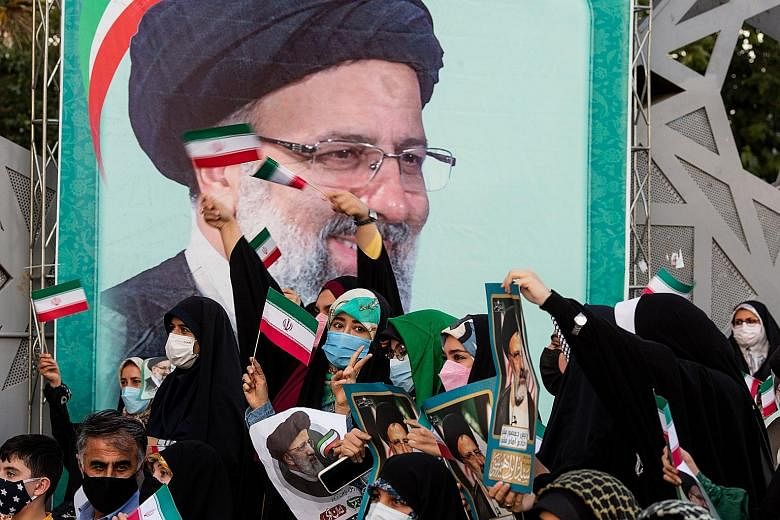DUBAI • Gulf Arab states are unlikely to be deterred from dialogue to improve ties with Iran after a hardline judge won the country's presidency, but their talks with Teheran might become tougher, analysts said.
Prospects for better relations between Muslim Shi'ite Iran and Sunni Gulf Arab monarchies could ultimately hinge on progress to revive Teheran's 2015 nuclear accord with world powers, they said, after Mr Ebrahim Raisi won last Friday's election.
The ultraconservative judge and cleric, who is subject to US sanctions, will take office in August, while nuclear talks in Vienna under outgoing President Hassan Rouhani, a more pragmatic cleric, are in progress.
Saudi Arabia and Iran, long-time foes, began direct talks in April to contain tensions at the same time as global powers were embroiled in nuclear negotiations.
"Iran has now sent a clear message that they are tilting to a more radical, more conservative position," said political scientist Abdulkhaleq Abdulla from the United Arab Emirates. He said Mr Raisi's election might make improving Gulf ties a tougher challenge. "Nevertheless, Iran is not in a position to become more radical... because the region is becoming very difficult and very dangerous."
The UAE, whose commercial hub Dubai is a trade gateway for Iran, and Oman, which often plays a regional mediation role, were swift to congratulate Mr Raisi. Saudi Arabia and Bahrain are the only Gulf states yet to comment.
"The faces may change, but the leader is (Supreme Leader Ayatollah Ali) Khamenei," columnist Khaled al-Suleiman wrote in the Saudi newspaper Okaz.
Mr Raisi, an implacable critic of the West and an ally of Mr Khamenei who holds ultimate power in Iran, has voiced support for continuing the nuclear talks.
"If the Vienna talks succeed and there is a better situation with America, then (with) hardliners in power, who are close to the supreme leader, the situation may improve," said Dr Abdulaziz Sager, chairman of the Gulf Research Centre.
A revived nuclear deal and the lifting of US sanctions on the Islamic Republic would boost Mr Raisi, easing Iran's economic crisis and offering leverage in Gulf talks, said Dr Jean-Marc Rickli, an analyst at the Geneva Centre for Security Policy. Neither Iran nor Gulf Arabs want a return to the tensions of 2019 which saw attacks on tankers in Gulf waters and on Saudi oil installations, then the 2020 US killing, under former president Donald Trump, of top Iranian general Qassem Soleimani.
A perception that Washington was now disengaging militarily from the area under US President Joe Biden has prompted a more pragmatic Gulf approach, analysts said. Nevertheless, Mr Biden has demanded that Iran rein in its missile programme and end its support for proxies in the region, including in Yemen, which are key demands of Gulf Arab nations.
"The Saudis have realised they can no longer rely on the Americans for their security... and have seen that Iran has the means to really put pressure on the kingdom through direct attacks and also with the quagmire of Yemen," Dr Rickli said.
Saudi-Iran talks have focused mainly on Yemen, where a military campaign led by Riyadh against the Teheran-aligned Houthi movement for over six years no longer has US backing.
The UAE has maintained contacts with Teheran since 2019, while also forging ties with Israel, Iran's arch regional foe.
Dr Sanam Vakil, an analyst at Britain's Chatham House, wrote last week that regional conversations, particularly on maritime security, were expected to continue but "can only gain momentum if Teheran demonstrates meaningful goodwill".
Meanwhile, Israel yesterday condemned the election of Mr Raisi as Iranian president, saying his would be a "regime of brutal hangmen" with which world powers should not negotiate a new nuclear deal.
Mr Raisi secured victory as expected last Saturday in Iran's presidential election after a contest marked by low voter turnout amid economic hardships and political restrictions.
Israeli Prime Minister Naftali Bennett, convening his first televised Cabinet session since taking office last week, described Mr Raisi's ascent as enabled by Ayatollah Khamenei rather than by a free and popular vote.
"Raisi's election is, I would say, the last chance for world powers to wake up before returning to the nuclear agreement, and understand who they are doing business with," said Mr Bennett in a statement he read out first in Hebrew and then in English. "A regime of brutal hangmen must never be allowed to have weapons of mass-destruction," he added. "Israel's position will not change on this."
Separately, Teheran's top nuclear negotiator said Iran and six world powers have moved closer to reviving their 2015 nuclear deal, adding that after the meeting in Vienna yesterday, the delegations will return to their respective capitals for consultations.
"We are now closer than ever to an agreement, but the distance that exists between us and an agreement remains and bridging it is not an easy job," Mr Abbas Araqchi told Iranian state TV.
Mr Mikhail Ulyanov, the Russian envoy at the EU-chaired talks, said negotiators trying to save the deal were set to meet yesterday to "decide on the way ahead".
REUTERS

